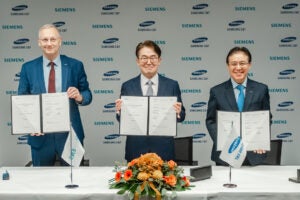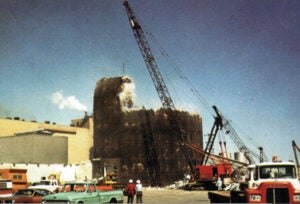Apparently deciding that half a loaf is better than none, Southern California Edison (SCE) on Monday submitted a draft proposal for a voluntary license amendment to the Nuclear Regulatory Commission (NRC) for the troubled San Onofre Nuclear Generating Station (SONGS), in hopes of salvaging its plan for a five-month limited-power restart test. The move appeared to be in response to pressure from local groups seeking to keep the reactor shut down.
SONGS has been idle for over a year after accelerated wear was discovered in the steam generator tubes in both units of the two-reactor plant. Unit 3, which suffered a tube rupture, has since been defueled and mothballed. SCE has spent several months trying to convince regulators to allow it to operate Unit 2 at 70% power this summer in order to test repairs and its belief—based on extensive evaluations—that operating at reduced power will prevent a recurrence of the accelerated wear problems.
The license amendment, in effect a de-rate, would limit operations to no more than 70% power. The reactor would then be shut down for inspections and, assuming all is well, operated at 70% power for remainder of the 18- to 24-month operating cycle.
SCE officials discussed the proposal with the NRC at a public meeting in Washington on Wednesday. The utility is still seeking to run Unit 2 at 100% power eventually, Rich St. Onge, SCE’s director of nuclear regulatory affairs said at the meeting. “We view [the license amendment request] as a parallel path” toward that goal, he said. Under the proposed plan, “There is no significant increase in the probability of an accident,” said Ryan Treadway, manager of nuclear regulatory affairs at San Onofre, and “no change that involves a significant change in the margins of safety.”
The final license amendment request should be submitted in about a week, St. Onge said.
Opponents of the restart have been pushing for a full license amendment process, which would involve public hearings, but SCE is asking the NRC to expedite review of the request in order to get the reactor back in service in time for summer demand. SONGS is the largest source of baseload generation and voltage support in the region. “We are considering the proposed voluntary amendment as the best path to get Unit 2 safely up and running before the hottest months of the year hit our region,” said SCE President Ron Litzinger in a statement. NRC staff at the meeting refused to make any promises on the timing of a decision, however.
The tube damage was traced to a faulty computer model used by manufacturer Mitsubishi Heavy Industries (MHI) when the steam generators were replaced in 2009 and 2010. A heavily redacted root cause analysis on the incident prepared by MHI and publicly released last month by the NRC suggested both MHI and SCE may have been aware of the potential for problems before the steam generators were installed. MHI and SCE insisted after the report was released that it demonstrated their belief that the plant was safe and that changes were not needed. Plant opponents, however, suggested design changes were avoided because they might have triggered the need for a license amendment proceeding.
Sources: SCE, NRC, Reuters, Los Angeles Times
—Thomas W. Overton, JD, Gas Technology Editor (@Thomas_Overton)
This story was first published April 3.







